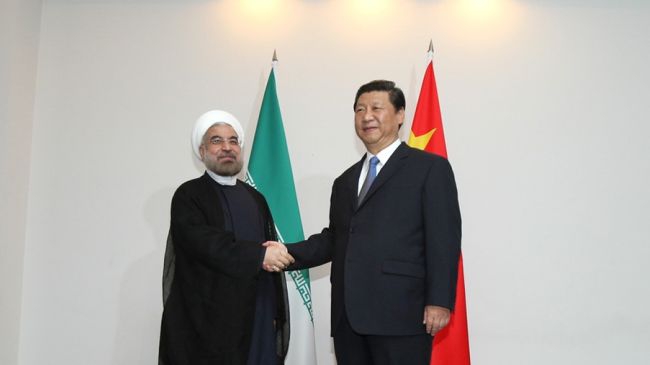 Irans President Hassan Rouhani has called for Chinas firm stance against what he described as the excessive demands of certain countries in nuclear talks with Tehran.
Irans President Hassan Rouhani has called for Chinas firm stance against what he described as the excessive demands of certain countries in nuclear talks with Tehran.We expect China as a major and responsible country in the international community to play its role against excessive demands of some countries, Rouhani said in a telephone conversation with his Chinese counterpart Xi Jinping, on Tuesday.
Rouhani said that Tehran expects Beijing to play a stronger role in the efforts to resolve the dispute over Irans nuclear energy program.
The Iranian president said that Tehran is determined to settle the issue within the frameworks of international law.
Xi, for his part, praised what he described as smart steps by Iran over its nuclear program and its foreign policy agenda.
He said a peaceful resolution of the case will only happen when the nuclear talks are based on mutual respect and the principle of equality.
Meanwhile, Chinese Foreign Ministry spokesman Hong Lei said on Tuesday that his country will continue to play a constructive role in pushing ahead with the talks to achieve a sound result in the upcoming nuclear negotiations between Iran and the six world powers.
Hong also said China will be represented by Deputy Foreign Minister Li Baodong in two days of talks.
Talks between Iran and the five permanent members of the United Nations Security Council -- Britain, China, France, Russia and the United States -- plus Germany will resume in Geneva on Wednesday under intense lobbying effort and pressures by Israel to prevent a deal between Iran and the six world powers.
On Monday, in a telephone conversation with Russian President Vladimir Putin, Rouhani said that "at the recent Geneva talks good progress was made, but everyone must realize excessive demands could complicate the process towards a win-win agreement."
Putin also told the Iranian president that there is a "real chance" to resolve the Western dispute over Tehrans nuclear energy program.
During the last round of talks earlier in November in Geneva, a first-step agreement was within reach but French Foreign Minister Laurent Fabiuss stance in favor of the Israeli regime and a lack of commitment by US Secretary of State John Kerry spoiled the negotiations.
By Press TV
The Iran Project is not responsible for the content of quoted articles.











